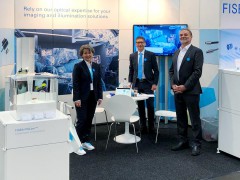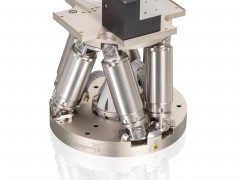
European Commission continues support for photonics
source:http://www.electrooptics.com/
keywords:Photonics21EuropeanCommissionPhotonics
Time:2015-06-11
The European Commission has pledged further support for Photonics21 at its annual meeting in Brussels. Günther Oettinger, Commissio
ner for the Digital Eco
nomy and Society, commented during the meeting on the 29 May: ‘Europe is well placed to invest further in photonics,’ adding that ‘photo
nics can make a significant co
ntribution to corporation and research’.


At the end of 2013, Photonics21 secured €700 million over seven years from the European Commission as part of the Photo
nics Public Private Partnership (PPP). The PPP was created under the Horizon 2020 funding programme, a €70 billion research and innovation plan.
The assigned PPP budget for the 2016/17 Horizon 2020 topic calls is around €203 million, Michael Mertin, the president of Photonics21 and CEO of Jenoptik, said during the meeting. This is after a reduction in the budget due to the Juncker Plan, but a gain in funding from the Factories of the Future programme.
In an article for Electro Optics, Mertin commented: ‘The main objective of this €700 million [PPP] programme is to increase Europe’s market share in the successful invention and production of goods – an area still dominated by the USA and Asia – and thereby overcome the fact that Europe’s strength so far is mainly located in developing technical advantages.’
Oettinger called for greater knowledge of photo
nics in a wider range of areas, which he said should be facilitated by regio
nal hubs and competence centres. ‘Everyone should have access to photo
nics and an understanding a
bout photonics,’ he said during the meeting.
He also drew attention to the photo
nics skills gap in education and said that this year being the Internatio
nal Year of Light is a good opportunity to bridge that gap. He called for the members of Photonics21 to support the IYL initiatives for schools.
The industry participation in seleced European Commission projects grew from 36 per cent in 2012 to 53 per cent in 2014, with a greater than 25 per cent participation from SMEs.
Eugene Arthurs, CEO of SPIE, emphasised the im
portance of bodies like Photonics21 in Europe to unite industry, academia, and government, adding that, in the USA, photo
nics has very little profile.
The Natio
nal Photo
nics Initiative in the US is attempting to address this, which has had success with the Integrated Photo
nics Institute for Manufacturing Innovation (IP-IMI) and the Photo
nics Industry Neurophoto
nics Group, which has ties to the White House BRAIN initiative.
Giorgio Anania, vice president of Photonics21, noted that, alo
ngside Horizon 2020, there are other sources of funding open to photo
nics players, such as that from the European Investment Bank, Germany’s KfW, and BPI in France. He also made the point that venture capital investment in Europe is drying up, but that corporate investors are stepping in to fill the gap.
Photonics21 is now looking to address some of the societal challenges within Horizon 2020, including areas such as health and food security, smart cities and buildings, secure society, resource efficiency, and smart transport, all areas wher photo
nics has a role.
MOST READ
- RoboSense is to Produce the First Chinese Multi-beam LiDAR
- China is to Accelerate the Development of Laser Hardening Application
- Han’s Laser Buys Canadian Fiber Specialist CorActive
- SPI Lasers continues it expansion in China, appointing a dedicated Sales Director
- Laser Coating Removal Robot for Aircraft
PRODUCTS
 FISBA exhibits Customized Solutions for Minimally Invasive Medical Endoscopic Devices at COMPAMED in
FISBA exhibits Customized Solutions for Minimally Invasive Medical Endoscopic Devices at COMPAMED in New Active Alignment System for the Coupling of Photonic Structures to Fiber Arrays
New Active Alignment System for the Coupling of Photonic Structures to Fiber Arrays A new industrial compression module by Amplitude
A new industrial compression module by Amplitude Menhir Photonics Introduces the MENHIR-1550 The Industry's First Turnkey Femtosecond Laser of
Menhir Photonics Introduces the MENHIR-1550 The Industry's First Turnkey Femtosecond Laser of Shenzhen DNE Laser introduced new generation D-FAST cutting machine (12000 W)
more>>
Shenzhen DNE Laser introduced new generation D-FAST cutting machine (12000 W)
more>>





